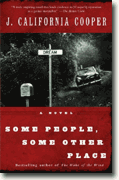Some People, Some Other Place
J. California Cooper
book reviews:
· general fiction
· chick lit/romance
· sci-fi/fantasy
· graphic novels
· nonfiction
· audio books
· author interviews
· children's books @
curledupkids.com
· DVD reviews @
curledupdvd.com
newsletter
win books
buy online
links
home
for authors
& publishers
for reviewers

 |
Some People, Some Other Place J. California Cooper Anchor Paperback 384 pages April 2006 |
|
Once upon a time, there was a poor girl whose family made her do almost all the housework. After a lifetime of drudgery, she tries to break free but is brutally put back in her place on the eve of her triumph. At the last moment, an unexpected kindness lifts her above her troubles, and through the efforts of others and her own spiritual purity, she triumphs over her beginnings and finds true love and happiness.
Of course, there are differences in the details. Eula Too, the story’s Cinderella, is a girl from a poor black family, her goal not Prince Charming but the city of Chicago. The fairy godmother is replaced by Madame Zola. Eula Too’s disaster is not a missed ball but a brutal rape on her trip to Chicago. Eula’s family is less evil than overwhelmed. And the incarnation of Prince Charming is a hard-working man hidden until almost the end of the book. And then - or perhaps "But first" - there is the moral. Not content to let readers glean the obvious moral from the success granted the studious, emotionally virginal Eula Too, Cooper loads her book with preachers eager to tell Eula and the reader about the magic powers of the Bible and the prevalence of Satan in the world. The child-spirit is the most grating of these. The proto-child constantly insists that it possesses deep spiritual knowledge but only shares this supposed insight in the form of clichéd, often close-minded moralizing. The spirit never assists the characters along their familiar path, nor acts as narrator. Instead, the pre-child spirit lurks around the edges of the story, popping up to deliver vaguely relevant or very disturbing commentary. The scene where Eula Too and her husband first make love takes on a rather less romantic feeling when her future child reminds everyone that it is watching, too. These often unnerving interruptions seem to serve no purpose beyond further hammering in the book’s already blatant moral advice. Besides the child spirit, Eula has spiritual advice handed to her by neighbors, family, friends, and everyone but her cat. This advice not only boils down to but also starts out as the same thing: The Bible is the only book that tells people to live with love, God will show the way to peace, Satan works in mysterious ways, and - somewhat incongruously - the path to happiness is in taking care of yourself instead of others. Eula receives it all with the reaction of a tape recorder, and it never seems to do her any good. With the sympathetic surroundings of her own poverty removed, Eula instead becomes deeply unlikable. Forever critical of others and the way of the world, ignorant of herself, Eula gains no obvious comfort from the repeated advice of her friends. Surrounded by wealth, relying on the Bible the story insists is the path to happiness, sharing of her fortune or hoarding, Eula goes through her life miserable until she meets a good man. Aside from her push to Chicago, Eula lives life as a victim, forever waiting for the next coincidence, the next savior to end her own unhappiness, and largely ungrateful when these rescues come. It doesn’t help that seemingly every resident of Eula’s world has an equally hard life story and ten times as much intelligence and motivation. Ha, a child-bride from China, barely enters the story before it ends; but she had time to free herself and another child from slavery, learn several languages, save her own daughters from the limits of their culture, and take positive, if small, action for her future. All of this she does with no help from the Bible or any magical floating fetuses, and while maintaining good cheer. It is a stark and telling contrast to Eula’s apparently blessed, inwardly miserable existence. Cooper’s writing style is well suited to this sort of expanded fairy tale. Like the early Grimm stories, these characters live in worlds of flat, unalterable facts. When characters are sad or happy, the fact is stated, and the story moves on. It is a style that invites reader identification with the characters. That identification is sadly shattered by the swinging hammer blows of morality applied to the entire story. Originally published on Curled Up With A Good Book at www.curledup.com. © Sarah Meador, 2006 |
| Also by or featuring J. California Cooper: |
|
|
|
 Click here to learn more about this month's sponsor! |
|
| fiction · sf/f · comic books · nonfiction · audio newsletter · free book contest · buy books online review index · links · · authors & publishers reviewers |
|
| site by ELBO Computing Resources, Inc. | |
 Add a fairy godmother and a glass slipper, and it’s the story of Cinderella. Add a kind brothel Madame and the disembodied moralizing spirit of an unconceived child, and it’s Some People, Some Other Place by J. California Cooper.
Add a fairy godmother and a glass slipper, and it’s the story of Cinderella. Add a kind brothel Madame and the disembodied moralizing spirit of an unconceived child, and it’s Some People, Some Other Place by J. California Cooper.